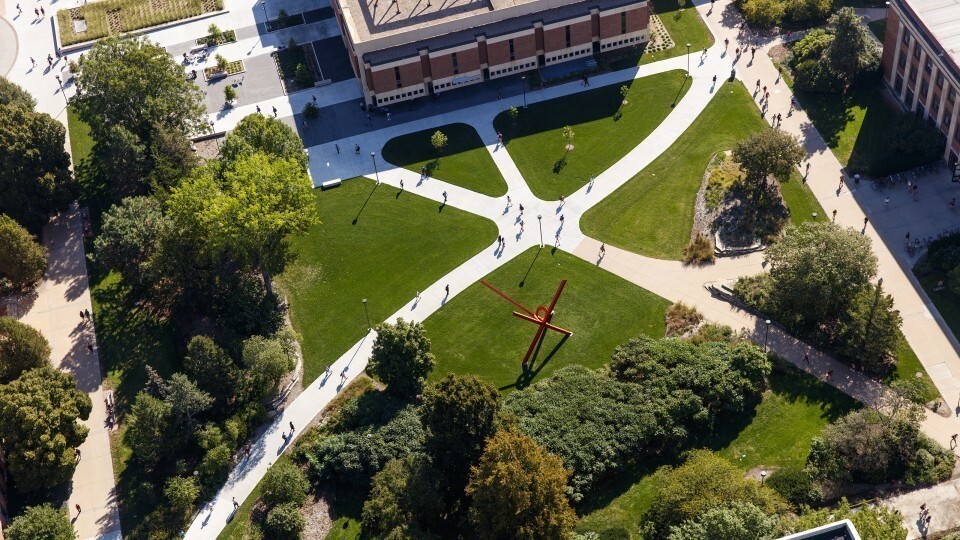
The University of Nebraska Board of Regents approved a 2018-19 operating budget that holds spending growth to near zero.
The budget package allows NU to implement significant cuts while simultaneously working to grow its impact on Nebraska’s economy and quality of life.
The $962 million state-aided budget, virtually flat compared to 2017-18, depends on $22 million in administrative cuts identified by the systemwide budget response teams, plus $6 million in programmatic cuts identified by the campuses, to manage three rounds of state funding reductions in the past 14 months.
In remarks to the regents, NU President Hank Bounds praised the work of budget response team members whose efforts have helped address an initial $49 million shortfall by cutting jobs and spending in areas like information technology, human resources, purchasing, and energy and facilities.
The reductions — equivalent to an 8 percent tuition increase — have protected, to the greatest extent possible, the university’s highest priorities of affordability and academic excellence, even as they have resulted in more than 100 lost jobs and disruptions across the campuses.
“Many institutions hunker down during times of crisis,” Bounds said. “None of us (the chancellors and I) have any interest in doing that. Our interest is around making this a better institution, growing this university, growing our research portfolio, growing our student population, keeping the best faculty here and attracting more as we move forward.
“We’ve been focused on getting better in spite of really challenging circumstances.”
Recent achievements highlighted by Bounds included:
Record-high NU enrollment of almost 53,000. This includes the third-straight year of record enrollment at the University of Nebraska–Lincoln where fall 2017 started with 26,079 students.
A five-year, $92 million contract renewal for the National Strategic Research Institute, NU’s military and defense research initiative.
The university’s $3.9 billion annual economic impact, including 11,000 new graduates each year who help grow Nebraska’s workforce.
The growing international presence of NU’s Water for Food Global Institute, which is working to find solutions to feed a population that will require twice as much food by 2050.
The opening of Howard L. Hawks Hall, home to the University of Nebraska-Lincoln’s College of Business, which Bounds compared to the best educational facilities in the country.
Progress at Nebraska Innovation Campus, designed to foster public-private partnerships that will attract talent and create jobs for the state’s economy.
Injecting a “dose of realism” about the impact that further cuts in state funding would have on the university’s upward trajectory, Bounds said: “I worry about our ability to continue to have those kinds of announcements if the next two years look like the past two years.”
Even if the university’s state appropriation were held flat in the next two-year budget cycle, mandatory cost increases like collective bargaining, health insurance and utilities would create a $64 million recurring shortfall. Given the administrative cuts that have already been made and NU’s use of cash to manage the current challenge, Bounds has said further reductions “would require us to have a candid conversation” about what kind of university Nebraskans desire.
The budget approved by the board authorizes Bounds to implement a midyear tuition increase if university appropriations are withheld in 2018-19. State appropriation allotments were held back by 2 percent in both 2016-17 and 2017-18. Governor Pete Ricketts has agreed to communicate to Bounds by Oct. 31 whether appropriations will be withheld.
The 3.2 percent tuition increase amounts to $6.25 to $7.50 more per credit hour for most resident undergraduates. Costs at NU campuses continue to be well below the peer averages, and Bounds said the university’s goal is to continue to ensure that higher education is affordable and accessible for Nebraska families.
The budget also includes a 1.75 percent increase in the salary pool for non-bargained employees, to be distributed on the basis of merit.
The president and chancellors now turn their focus to developing a 2019-21 state funding request to bring to the Board of Regents in August. In addition to core needs like compensation, health insurance and utilities, Bounds said university leadership also will consider what kinds of investments might support NU’s efforts to expand access for students and grow Nebraska’s economy and workforce.







